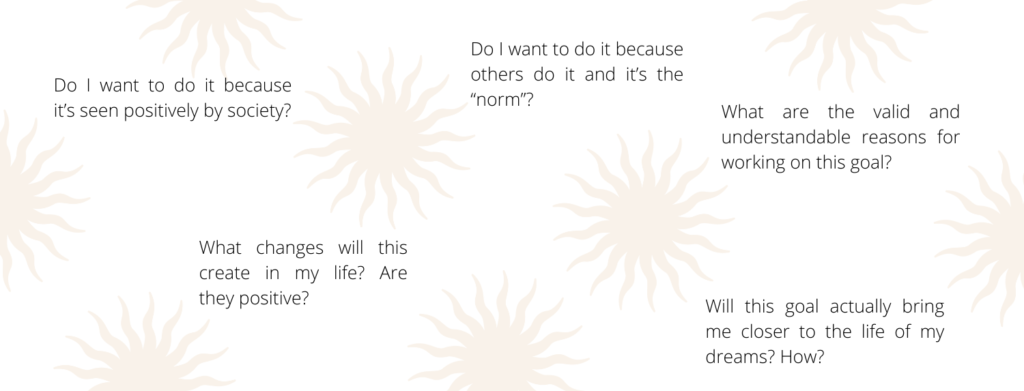The start of a New Year brings along a powerful and magical energy of renewal and resolutions. Endless possibilities and wild dreams start filling our mind and heart. We have the motivation to establish new habits. It is our year and it’s going to be great!
But then creeps the feeling of guilt (and even shame) for not having accomplished all the goals we had set the previous years. And with it comes the beliefs that we will surely break our promises once again because history has proven us that we’re not reliable when it comes to New Year’s resolutions. What’s more, to make this realization slightly less painful, we also trick ourselves into believing that anyway it was another silly goal of ours and it wasn’t that important.
So here we are, trapped between the dreamy possibilities that brings the New Year and our limiting beliefs. We’re believing only halfheartedly in our ability to actualize these goals, all the while lying to ourselves about their unimportance. We’re not fully in, we’re not fully out. And we’re ready to half-ass these goals and dreams and break our promises once again. We’re forever repeating and reinforcing the same story.
But how do we break this cycle?
What goals and dreams do I choose?
- First, we need to pick our goals wisely, because if you don’t genuinely want to do them, it is not going to work. This means asking ourselves why we really want to do this. Your goals should make your whole being excited and eager to start because it’s a step closer to your dream life. It should feel like the sunrise bringing the promise of a wonderful day…
Here are some questions to ask yourself and answer honestly:

2. Let’s make it SMART
Make it Specific
Make it Measurable. How will you know you have achieved it?
Is it Achievable? Break it down into the smallest and easiest steps to achieve.
It should be Relevant to your reality. Is it really something you need/want to do to get you where you want to be? (We’ve done this just above, so you should be good)
Give it a Timeframe. How long do you give yourself? And why? How relevant is it? If you didn’t make it happen by that time, don’t give up. Rethink and adjust your timeframe.
Smart goals are more likely to be achieved.
Let’s get motivated!!!
One big mistake is to rely on the excitement of the New Year, the new goals and our intrinsic motivation. The latter is only present when we find an activity pleasurable, challenging or entertaining in itself. The goals we have set may fall into this category the first few days because it’s a new challenge. But they often quickly lose their challenging nature, stealing our intrinsic motivation. As a result, we need to rely on two extrinsic types of motivation (identification and integration) and their internalization processes.
- Make sure you integrate your goal as a part of your dream self. This will give the goal a profound meaning and more value for you. This is where a visualisation exercise followed by the creation of a nice mood board can be useful! Try the January Growth but instead of visualising a day in your dream life, visualise how a random day would look and feel like once you have achieved your goal.
- Keep reminding yourself of the reasons for working on this goal! Now that your mood bord is done, look at it!
- Don’t stay alone! Foster a feeling of belonging and connectedness by joining a nice community/ club that does want you want to achieve, surround yourself with people who already do what you want to achieve, follow inspiring online accounts, …
- Celebrate your wins and keep track of your success. You can use the “don’t break the chain” idea, write your wins down in a cute notebook (make sure it’s visible and not hidden in a drawer), surround yourself with people who support you in this, … This will bring you a feeling of competence, which will boost the internalization process.
- Make sure you have some autonomy! Organize it how you want, modify it to your preferences, ….
Remember:
Using punishment or reward (external regulation) and involving our self-esteem (e.g. self-criticism, pressure to perform, validation, …) (introjection) as a motivation isn’t long lasting because our motivation becomes too externally driven and once those are gone, we’re very likely to stop working on our goal.
Let’s create a habit!
Habits can be great. But sometimes they’re not. When done wisely, self-discipline and routine can contribute to subjective wellbeing enhancement. When done not so wisely, they can hinder the happiness-boosting benefits of an activity (hedonic adaptation). What we want is to habitually initiate an activity rather than habitually performing the same action the exact same way every time. It also makes you lose the intention behind it, it can become empty like the “thank you” that we throw in the air without actually meaning it… it’s just out of habit.
- Combine the new habit to something you already do without effort and that you enjoy. This will help initiate the activity (which is the hardest).
Example: You want to read more and you love drinking tea and candles. What do you do? You make yourself a cup of tea, light your candles and you grab your book. - Plan. Make time for this new goal. Write it down. Set alarms and reminders.
- Make sure you bring some novelty to avoid feeling bored and stuck in a rut. This can be small things for instance the time of the day, the people with whom you do it, the music you use, its content, … Get creative.
After some time, you will probably experience less and less psychological resistance to starting your new activity. At some point you’ll probably feel the benefits of having implemented this new goal in your life and you will start actually enjoying it for what it is. And maybe one day intrinsic motivation alone will make you do it…

